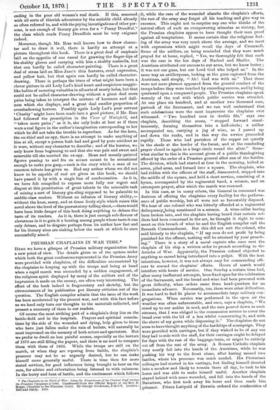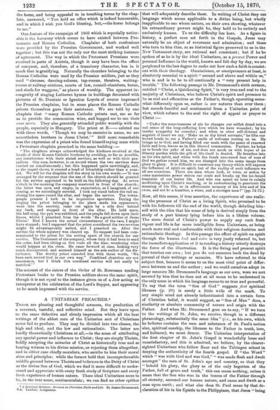PRUSSIAN CHAPLAINS IN WAR TIME.*
HERE we have a glimpse of Prussian military organization from a new point of view. The details given us of the system under which both the great confessions represented in the Prussian Army were provided with chaplains, of the difficulties encountered by the chaplains in keeping up with the troops and being at hand when a rapid march was succeeded by a sudden engagement, of the religious spirit displayed by many of the soldiers and of the impression it made on the enemy, are often very interesting. The effect of the book indeed is fragmentary and sketchy, but the circumstances of its publication put literary criticism out of the question. The English compiler admits that the issue of the work has been accelerated by the present war, and with this fact before us we heed only turn our thoughts to the materials collected, and present a summary of them to our readers.
Of course the most striking part of a chaplain's duty lies on the battle-field and in the hospitals. Prayers and spiritual consola- tions by the side of the wounded and dying, help given to those who have just fallen under the rain of bullets, will naturally be most impressed on the memory of both actors and spectators. But we prefer to dwell on less painful scenes, especially as the horrors of 1870 are still filling the papers, and there is no need to compare them with those of 1866. While the troops are still on the march, or when they are reposing from battle, the chaplain's presence may not be so urgently desired, but he can make himself more generally useful. There is time then for more stated services, for good influences being brought to bear on the men, for advice and exhortation being listened to with calmness. In the hurry and heat of battle, and the excitement which follows
• The Chaplain in the Field of War: being the Experiences of the Clerical Stair during the Prussian Campaign of 1866. Condensed from the Official Report of the Rev. B. Rogge, Chaplain to the Prmaian Court By George Gladstone, P.R.G.S. London Bell and Daldy. 1870.
•
ending in the poor old woman's real death. If this, seasoned it, while the care of the wounded absorbs the chaplain's efforts, with all sorts of thievish adventures by the amiable child already the rest of the army may forget all his teaching and give way to so often referred to, and with the prying investigations of other per- excesses. This ought not to surprise any one who thinks of the sons, is not enough of literary gin even for a " Penny Dreadful," natural effect of such an overpowering stimulus as victory, but the class which reads Penoy Dreadfuls must be very exigeant the Prussian chaplains appear to have thought their men proof indeed, against all temptations. It seems certain that the religious feel- Moreover, though Mr. Ross well knows how to draw charae- ing of the army was very much above the average, and we meet ter and to draw it well, there is hardly an attempt at a with expressions which might recall the days of Cromwell.
picture throughout this book. There is a great deal of emphasis Some of the soldiers, on being reminded that they were much laid on the appetite of one rascal for gnawing the finger-tips of prayed for at home, replied, "Yes, we thoroughly felt that such his shabby gloves and carrying with him a shabby umbrella, but was the case in the hot days of Nachod and Skalitz. The that can hardly be called character-painting. There is a great Austrians attributed our success to our arms, but we know better,; deal of stress laid on Miss Jane's thin features, cruel expression, it was not our guns, but our Lord God who helped us." In the and yellow hair, but that again can hardly be called character- same way an artilleryman, looking at the guns captured from the drawing. There is perhaps the trace of what might have been a Austrians, said simply, " Ah ! God was with us." That these clever picture in old Lady Lad's kind heart and suspicious magpie- were not mere phrases appeared from the general conduct of the like habits of secreting valuables in all sorts of musty holes, but that troops before they were touched by exceeding success, and by being could not be called character-drawing without a great deal more quartered upon a conquered people. The Prussian chaplains speak pains being taken to interpret the mixture of keenness and dull- warmly of the zeal with which public service was attended. ness which she displays, and a great deal smaller proportion of At one place six hundred, and at another two thousand men, overshadowing horrors. Possibly again Lady Lad's poor servant partook of the Sacrament, and we can well understand that 'Charity' might hair(' been made into a good picture, if Mr. Ross such celebrations were the most impressive the chaplains ever had followed the prescription in the Vicar of Wakefield, and witnessed. "Two hundred men in double file," says one "taken more pains ;" as it is, she only looks at best as if there chaplain, describing the scene, "stepped forward aimul- were a real figure in the author's imagination corresponding to her taneously, forming themselves into a half-circle ; a soldier which he did not take the trouble to reproduce. As for the hero, accompanied me, carrying a jug of wine, as I passed up the ex-thief and ex-spy, there is no attempt to make anything of and down the ranks, and in this way the service proceeded him at all, except a person both bad and good by pure accident as rapidly. Those who had partaken of the supper sat quietly it were, without any character to describe ; and of the heroine, we in the shade at the border of the forest, and at the concluding only know from beginning to end that she was pale and sweet and prayer closed in again in a large circle round the altar." Some- miserable till she married the ex-spy. Mean and meanly-painted what similar to this is the account given of a public thanksgiving figures passing to and fro on scenes meant to be sensational offered by the order of a Prussian general after one of the battles. enough to make you gasp,—such is the story which a man of no The division, which had started at four in the morning, halted at common talents has given us. Had any author whom we did not seven, piled arms, and formed into a square. The chaplain, who know to be capable of real art given us this book, we should had ridden with the officers of the staff, dismounted, stepped into have passed it by with a single line of condemnation. As it is, the middle of the square, and held a short service, consisting of a we have felt compelled to express more fully our regret and hymn, accompanied by the regimental baud, a sermon, and an disgust at this prostitution of great talents to the miserable task extempore prayer, after which the march was resumed. the horse, and being appealed to in touching terms by the chap- lain, answered, "You hold an office which is indeed honourable, and in which I wish you God's blessing, but,—the horse belongs to me."
One feature of the campaign of 1866 which is especially notice- able is the harmony which seems to have existed between Pro- testants and Roman Catholics. Chaplains of both confessions were provided by the Prussian Government, and worked well together ; but this was not the only nor the most striking instance of agreement. The way in which the Protestant Prussians were received in parts of Austria, though it may have been the effect of conquest, and, therefore, of a transitory character, has in it much that is gratifying. Naturally the churches belonging to the Roman Catholics were used by the Prussian soldiers, just as they used "circuses, dancing-saloons, tap-rooms, theatres, waiting- rooms at railway-stations, courts of law, council-chambers, barns, and sheds for waggons," as places of worship. The apparent in- congruity of singing Lutheran hymns in buildings decorated with pictures of St. Dominic or Ignatius Loyola of course impressed the Prussian chaplains, but in some places the Roman Catholic priests themselves gave their assistance. We are told by one chaplain that "many Roman Catholic priests met, me so far as to provide the communion wine, and begged me to use their vasa sacra. They also generally attended public worship with the people, especially in Hungary. The priest at R— saluted me with these words, 'Though we may be enemies in name, we are nevertheless brothers in Jesus Christ.'" Still more remarkable was the expression of a priest who found himself saying mass while a Protestant chaplain preached in the same building :—
"The chaplains always acknowledged the kindness received at the hands of their Roman Catholic brethren by avoiding, as far as possible, any interference with their stated services, as well as with their pre- judices. One case, however, is on record where the two services were carried on simultaneously ; but this happened quite unwittingly, and, as the sequel shows, it created a bond of friendship rather than a scan- dal. We will let the chaplain tell the story in his own words :—'It was arranged by the sergeant that the use of the church should be granted for the service appointed to be held on the following day. At seven o'clock in the morning the company mustered in front of the church; the latter was open and empty, in expectation, as I imagined, of our coming, so we accordingly entered. 1 took my stand before the rail en- closing the space round the altar, and began the service. The towns- people present I took to be inquisitive spectators. During the singing the priest belonging to the place made his appearance, went into the sacristy, came out again by a side door behind my back, and stepped in front of the altar. He held mass, the bell rang, the pyx was exhibited, and the people fell down upon their knees, whilst I preached from the words 'Be a good soldier of Jeans Christ.' Had I known the actual circumstances of the case, I might have stopped ; but I supposed that the priest considered the two services might be advantageously united, and I preached on. After the service the whole mystery was cleared up. No request had been com- municated to the priest for the setting apart of the church for our service. The lieutenant of the company, whose duty it had been to send the order, had been sitting on live coals all the time, wondering what would happen at the close. He came forward at once, looking very much disconcerted, and accused himself as the sole author of the dis- turbance. The worthy priest consoled him with these words, 'We have each served God in our own way." Combined churches are not uncommon, but I think this combined service will not easily be matched.'"
The account of the sisters of the Order of St. Borromeo reading Protestant books to the Prussian soldiers shows the same spirit, though it is not equal to the instance given us of a Jew acting as interpreter at the celebration of the Lord's Supper, and appearing to be much impressed with the service.































 Previous page
Previous page